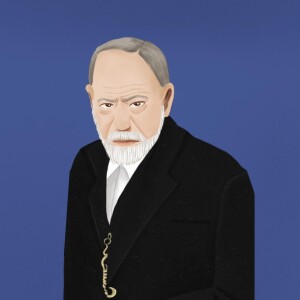
Friday Dec 29, 2023
The Life and Legacy of Peter Gay: A Journey Through History and Literature
Quotes of Freud book
- "The ego is not master in its own house." (The Ego and the Id)
- "Dreams are the royal road to the unconscious." (The Interpretation of Dreams)
- "It is impossible to escape the impression that people commonly use false standards of measurement — that they seek power, success and wealth for themselves and admire them in others, and that they underestimate what is of true value in life." (Civilization and Its Discontents)
- "Where id was, there ego shall be." (New Introductory Lectures on Psychoanalysis)
- "Unexpressed emotions will never die. They are buried alive and will come forth later in uglier ways." (The Complete Introductory Lectures on Psychoanalysis)
- "The first human being who hurled an insult instead of a stone was the founder of civilization." (Civilization and Its Discontents)
- "One is very crazy when in love." (Selected Papers on Hysteria and Other Psychoneuroses)
- "Most people do not really want freedom because freedom involves responsibility, and most people are frightened of responsibility." (Introductory Lectures on Psychoanalysis)
- "Love and work... work and love, that's all there is." (The Question of Lay Analysis)
- "I cannot think of any need in childhood as strong as the need for a father's protection." (The Interpretation of Dreams)
Books like Freud book
- "The Interpretation of Dreams" by Sigmund Freud - This book is a classic work by Freud that explores the unconscious mind and the interpretation of dreams, offering insights into the human psyche.
- "Civilization and Its Discontents" by Sigmund Freud - In this book, Freud delves into the sources of human aggression and the inherent tensions between the individual's desires and the demands of civilization.
- "Beyond the Pleasure Principle" by Sigmund Freud - Freud examines the concept of the death drive and its relation to unconscious motivations, exploring the complexities of human behavior and the pursuit of pleasure.
- "Totem and Taboo" by Sigmund Freud - Freud investigates the origins of culture and society, exploring the role of primitive instincts and rituals in shaping human societies.
- "The Ego and the Id" by Sigmund Freud - This book delves into Freud's theory of the three components of the mind (ego, id, and superego) and the ways in which these elements interact and shape human behavior.
- "Psychopathology of Everyday Life" by Sigmund Freud - Freud explores the unconscious motivations behind seemingly mundane errors, lapses, and misfortunes in everyday life, shedding light on the presence of unconscious thoughts and desires.
- "Introductory Lectures on Psychoanalysis" by Sigmund Freud - This book provides an overview of Freud's psychoanalytic theories, covering topics such as the nature of dreams, the development of sexuality, and the structure of the unconscious mind.
- "Moses and Monotheism" by Sigmund Freud - Freud investigates the historical origins of monotheistic religions, particularly Judaism, drawing on psychoanalytic insights to understand the role of Moses in shaping these belief systems.
- "Group Psychology and the Analysis of the Ego" by Sigmund Freud - Freud explores the dynamics of group behavior and the influence of the unconscious mind on collective behavior, shedding light on social phenomena such as mob mentality and groupthink.
- "The Future of an Illusion" by Sigmund Freud - Freud critically examines the role of religion in human society, offering a psychoanalytic perspective on the origins, functions, and potential illusions of religious beliefs.
Freud book summary
Freud: A Life for Our Time is a highly acclaimed biography of Sigmund Freud written by Peter Gay. The book offers a comprehensive and detailed account of Freud's life, his theories, and the historical and cultural context in which he developed his groundbreaking ideas.
The biography begins with Freud's childhood in Vienna and explores his formative years, including his studies in medicine and the development of his psychoanalytic method. It delves into Freud's personal life, relationships, and his struggles to establish his theories in a society that often regarded them with skepticism and even hostility.
Peter Gay provides a nuanced portrait of Freud's character, highlighting both his strengths and weaknesses. He explores Freud's passionate commitment to his work and his relentless pursuit of scientific knowledge, as well as his complex and sometimes controversial beliefs and behavior.
The book also sheds light on the historical and intellectual climate of the time, particularly the effects of World War I and the rise of anti-Semitism in Europe. It examines the challenges Freud faced as a Jewish intellectual and his struggle to gain recognition for his work, both within the scientific community and in wider society.
In addition to chronicling Freud's life and work, the biography offers a thorough analysis of his key concepts and ideas. It explains the significance of his theories on the unconscious mind, dreams, sexuality, and the Oedipus complex, among others.
By combining meticulous research with insightful analysis, Peter Gay presents the reader with a vivid and engaging portrayal of Sigmund Freud and his lasting impact on psychology, culture, and society. Freud: A Life for Our Time is considered one of the most influential and definitive biographies of Freud, offering a comprehensive understanding of his life and work for both scholars and general readers.
No comments yet. Be the first to say something!